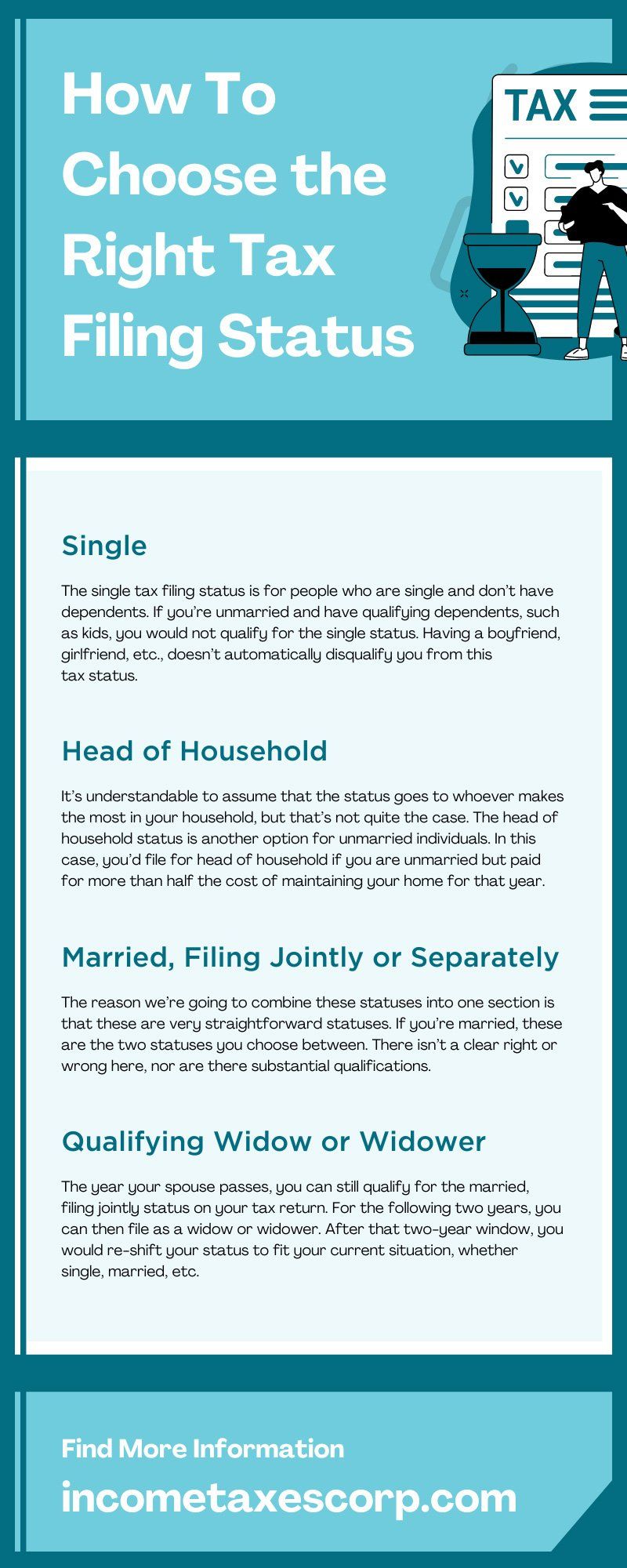How To Choose the Right Tax Filing Status

Filing taxes requires gathering a lot of information, some of which may seem straightforward, but not always. Plus, there is ample tax lingo to navigate, and that can become confusing quite quickly. For instance, do you know how to choose the right tax filing status? In some cases, a filing status can seem deceptively simple.
That said, some statuses may seem more complex than they are, so how do you narrow down your selection? The guide below details each tax filing status you can choose from and why you’d choose each one. Keep reading if you’re ready to learn how to choose the right status every year. After all, your status can change any year for many reasons.
The Purpose of a Tax Filing Status
Before getting too detailed too quickly, what is the purpose of a tax filing status? Since it’s only one box you check on your tax return, it may seem relatively minor. However, your tax filing status substantially impacts your final tax return.
More specifically, your filing status determines factors such as your deduction, tax credit, eligibility, and filing requirements. One of the first details you’ll have to fill out on your tax return is your filing status. So now that you know why these statuses are important, we can discuss what each status is and why you might choose it.
Discussing Each Status
On your tax return, you will be consistently presented with five different tax filing statuses. These statuses are single, head of household, qualifying widow or widower, married filing separately, and married filing jointly. Unfortunately, these options are a bit more complex than they appear. Let’s take a closer look at each option so you know precisely which one pertains to your current situation.
Single
It may surprise some people to learn this, but you don’t file “single” status just because you’re not in a relationship. The single tax filing status is for people who are single and don’t have dependents. If you’re unmarried and have qualifying dependents, such as kids, you would not qualify for the single status. Having a boyfriend, girlfriend, etc., doesn’t automatically disqualify you from this tax status.
Remember that having kids doesn’t automatically mean they’re a qualifying dependent. If your kids are in their 30s and earning a living on their own elsewhere, it’s not quite the same as raising a young child. This is what separates qualified dependents from others. If you are unmarried by the end of the year, then you would qualify as being unmarried for that tax return.
This might still sound a bit confusing, but there’s a simple way to avoid mistakenly choosing or neglecting to choose the single filing status. Assess the remaining statuses—if you’re unmarried and don’t qualify for any of them, then single is likely your right choice. In some cases, filing single can earn you lower taxes, so it’s not a step you want to overlook. When in doubt, talk with a tax professional about choosing the correct status for the upcoming tax season.
Head of Household
Now that you know more about filing taxes single, we can look at what head of household means here. This may appear confusing on the surface because how do you choose the head of household? It’s understandable to assume that the status goes to whoever makes the most in your household, but that’s not quite the case. The head of household status is another option for unmarried individuals.
In this case, you’d file for head of household if you are unmarried but paid for more than half the cost of maintaining your home for that year. In addition, you must have a qualifying dependent to qualify for the head of household status.
Like the single filing status, being unmarried by the last day of the year can still earn you the head of household title in the IRS’s eyes. This is another situation where having a tax expert by your side helps because this status can be a bit confusing to navigate. To provide further clarity, we will define both the married filing jointly and separately tax filing options.
Married, Filing Jointly or Separately
The reason we’re going to combine these statuses into one section is that these are very straightforward statuses. If you’re married, these are the two statuses you choose between. There isn’t a clear right or wrong here, nor are there substantial qualifications. Simply put, do you want to be in charge of your own taxes or yours and your significant other’s together? A married couple may choose to file separately if they’re in very different tax brackets, but the opportunity to do it jointly is still there.
So, what are the benefits of each? It all comes down to the tax deductions that vary between both statuses, but those will be unique to each couple, so discuss specifics with your tax experts. Remember that filing jointly doesn’t mean one of you has total control over the tax return. Instead, both of you are responsible in the eyes of the IRS. When filing jointly, consider completing the information together so you both are equally aware of how you’re filing.
Qualifying Widow or Widower
No, you wouldn’t file this status just because you’re a widow or widower. If you’re confused, don’t worry—this isn’t as complicated as it sounds. The year your spouse passes, you can still qualify for the married, filing jointly status on your tax return. For the following two years, you can then file as a widow or widower. After that two-year window, you would re-shift your status to fit your current situation, whether single, married, etc.
Now that you know how to choose the right tax filing status, you can better communicate with your CPA to ensure a smooth Tax Day every year. Of course, this requires finding a CPA who can help with your specific needs because not all taxes are the same. For example, our tax preparation services assist US expats with completing their taxes successfully. Once you find an expert who understands your needs, taxes should become more straightforward and convenient.












